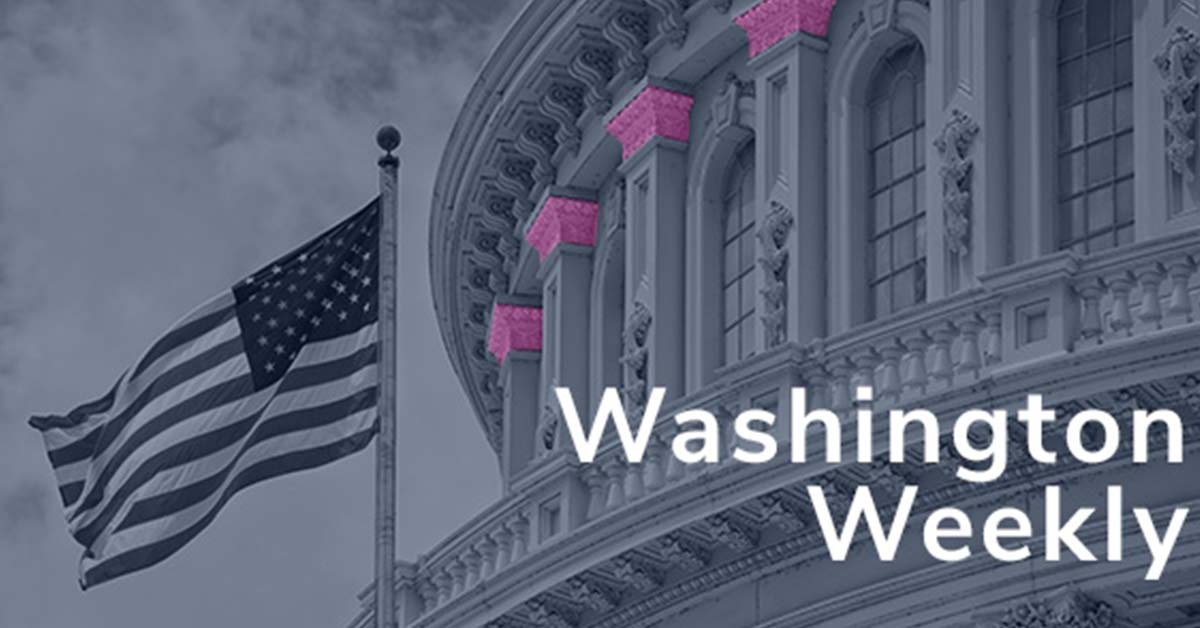
The House
This week, the House will consider H.R. 256, which would repeal the 2002 Authorization for the Use of Military Force that sanctioned U.S. military operations in Iraq. The Biden Administration supports the effort.
House Committees will also hold numerous hearings:
- House Financial Services Committee will conduct a hearing on digital currencies;
- House Education & Labor Committee will examine successful employment models for justice-involved individuals;
- House Transportation & Infrastructure Committee will analyze the impact of shipping container shortages, delays, and increased demand on the North American supply chain;
- House Homeland Security Committee will evaluate the federal response to the Colonial Pipeline ransomware attack;
- House Ways & Means Committee will review the President’s proposed FY22 budget requests.
Further, under suspension of the rules, the House will also consider numerous bills concerning water transportation and infrastructure projects, federal Airport Improvement Program grants, a taskforce to improve the FAA’s pilot alert system, and a number of veteran support and other VA measures.
The Senate
Last week, the Senate passed The Endless Frontier Act—a bill aimed at out-competing China in essential emerging technologies. The measure will now move to the House.
Although Sen. Shelley Moore Capito (R-WV) and President Biden walked away from infrastructure negotiations last week, a group of 20 bipartisan Senators – dubbed the G20 – have conducted their own negotiations and announced a consensus on a $1.2 trillion plan to be funded without raising taxes. The group includes Sens. Bill Cassidy (R-LA), Susan Collins (R-ME), Joe Manchin (D-WV), Lisa Murkowski (R-AK), Rob Portman (R-OH), Mitt Romney (R-UT), Jeanne Shaheen (D-NH), Kyrsten Sinema (D-AZ), Jon Tester (D-MT), and Mark Warner (D-VA).
The proposal would assign $579 billion in new spending. However, it does not include President Biden’s proposed corporate tax hike, will likely not tie the gas tax to inflation, nor does it include a mileage tax for EVs given the Administration’s opposition to raising taxes on those making less than $400,000 per year. Instead, Sen. Collins proposed that the plan be paid for through a combination of repurposing unspent COVID-19 relief dollars and creating a federal infrastructure project bank. Other Democratic members are skeptical about any bipartisan deal being reached, especially if it means climate-related provisions would be omitted.
If no deal emerges by the end of July, Democrats are prepared to go it alone through the reconciliation process. However, they face internal hurdles of getting all 50 Democratic Senators on board – Sens. Manchin and Sinema are holding out for a bipartisan agreement.
Senate Committees will host several hearings this week:
- Senate Energy and Natural Resources Committee will review the President’s proposed FY22 budget requests for the Department of Energy;
- Senate Banking, Housing and Urban Affairs Committee will discuss modern infrastructure needs with local leaders;
- Senate Finance Committee will review the President’s proposed FY22 budget requests;
- Senate Appropriations Committee will review the President’s proposed FY22 budget requests for the Department of Transportation;
- Senate Homeland Security and Governmental Affairs Committee will explore cybersecurity threats to state and local governments;
- Senate Banking, Housing and Urban Affairs Committee will host its second hearing on reauthorizing the National Flood Insurance Program;
- Senate Commerce, Science, and Transportation Committee’s Executive Session will include a markup of S. 2016, the Surface Transportation Investment Act, sponsored by Sens. Maria Cantwell (D-WA) and Roger Wicker (R-MS).
The Administration
President Biden is set to conclude his first G7 summit in office by lobbying NATO and G7 allies for stronger actions against China as it becomes more aggressive on the world stage. Furthermore, during weekend G7 sessions, leaders pledged to donate over 1 billion doses of COVID-19 vaccines to developing nations. G7 leaders did not reach a consensus on broad climate measures, though they did agree that coal is “the single biggest cause” of greenhouse gases and thus committed to ending overseas coal investments.
President Biden is continuing his overseas trip this week and will have meetings with President Erdogan of Turkey and President Putin of Russia. Recent controversies between America and these nations underscore the importance of the meetings, particularly with Russia. President Biden will confront Putin regarding the recent cyberattacks by Russian hackers. Relatedly, President Putin said in an interview this past weekend that he would be willing to discuss terms of extraditing cyber criminals
Becker’s Federal Lobbying Team will continue to monitor these developments as they evolve and will share with you as soon as information becomes available.